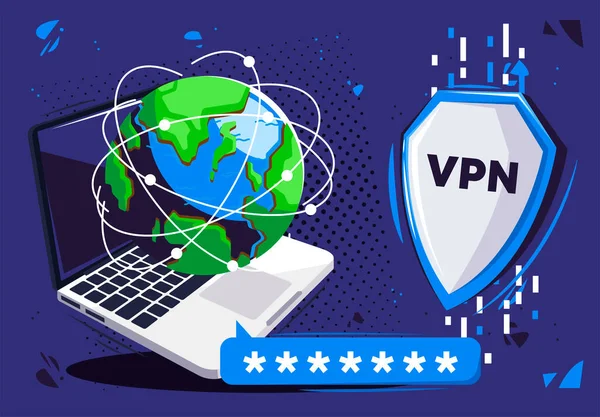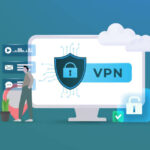Have you ever sat at a coffee shop, connected to the public Wi-Fi, and wondered who might be watching what you’re doing online? It’s a common feeling. We send so much personal information over the internet every day—our passwords, our messages, our banking details—without a second thought. But the truth is, that data can be exposed. This is where understanding VPN encryption becomes not just useful, but essential for protecting our digital lives. Think of it as learning a basic self-defense move for the internet.
So, what exactly is this digital shield? In simple terms, VPN encryption is the process of scrambling your internet data into a secret code that only you and the VPN server can understand. It creates a private, secure tunnel for all your online activity, keeping your information safe from hackers, your internet service provider, and even government snooping. In this guide, we’re going to walk you through everything you need to know, breaking down the complex tech into easy, bite-sized pieces. We’ll explore how this technology works, why it’s a cornerstone of modern cybersecurity, and how you can make sure you’re using it effectively.
What Is VPN Encryption and How Does It Work?
VPN encryption is the process of converting your readable internet data into an unreadable code to protect it from unauthorized access. It works by using complex mathematical algorithms, known as ciphers, to scramble your data. When you connect to a VPN, your device and the VPN server perform a “handshake.” They agree on a specific encryption method and exchange secret keys. These keys are like the secret password to a decoder ring. Anything you send online—like a visit to a website or a message—is first locked with this key. It travels through the internet in this scrambled form. When it reaches the VPN server, it uses the same key to unlock it and send it to its final destination. To anyone trying to snoop in between, it just looks like meaningless gibberish.
To really get it, let’s use an analogy. Imagine you’re sending a valuable postcard through the mail. Without encryption, anyone who handles it can read your message. With a VPN, it’s like putting that postcard inside a locked, metal box. Only you and the person with the key (the VPN server) can open it. The mail carrier, the sorting office, and anyone else in between just see a locked box, not your private message. This entire process happens in a split second, every time you click a link or send data. This secure pathway is often called a VPN tunnel, and it’s the foundation of how a VPN works to protect you.
Why Do We Need VPN Encryption in Our Daily Lives?
We need VPN encryption because our digital lives are constantly exposed to risks that can compromise our privacy, security, and even our financial well-being. Every time you go online, your data is on a journey. It travels from your device, through your router, across your Internet Service Provider’s (ISP) network, and onto the wider internet. At each step, there are points where your information can be intercepted. Without encryption, your online activities are essentially an open book.
Let’s look at some real-world scenarios where VPN encryption is not just a luxury, but a necessity. For instance, when you’re using public Wi-Fi at an airport, hotel, or coffee shop, these networks are often unsecured. It’s incredibly easy for a hacker on the same network to set up a “man-in-the-middle” attack and intercept your data. They could grab your login credentials for social media or, worse, your online banking information. This is a primary reason why you should use a VPN on public Wi-Fi. But it’s not just about public Wi-Fi. Your ISP can see and log all your browsing history. They can sell this data to advertisers or even throttle your internet speed if they don’t like what you’re doing online. A VPN encrypts your traffic, so your ISP can’t see what you’re doing, only that you’re connected to a VPN server. These are just a few of the many benefits of using a VPN, all of which are built on the foundation of strong encryption.
What Are the Main Types of VPN Encryption Protocols?
The main types of VPN encryption protocols are OpenVPN, WireGuard®, IKEv2/IPsec, L2TP/IPsec, and PPTP. A protocol is simply a set of rules that dictates how the encryption process happens. Think of it like choosing a language for your secret code. Some are faster, some are more secure, and some are better for specific situations. Choosing the right one is key to getting the best balance of speed and security for your needs.
Let’s break down the most common ones you’ll encounter when you explore what is a VPN and its settings.
- OpenVPN: This is the long-standing champion of security. It’s an open-source protocol, which means its code is available for anyone to inspect. This transparency makes it incredibly trustworthy, as security experts around the world are constantly checking it for flaws. It’s highly configurable and uses very strong encryption libraries like OpenSSL. The main trade-off is that it can sometimes be a bit slower than newer protocols because of its more complex design.
- WireGuard®: This is the new kid on the block, and it’s making a huge splash. WireGuard® was designed to be extremely fast, simple, and modern. It uses a much smaller codebase than OpenVPN (about 4,000 lines of code versus over 600,000), which makes it easier to audit for security vulnerabilities. It’s known for its incredible speeds and state-of-the-art cryptography. Many modern VPN services are rapidly adopting WireGuard® as their new default.
- IKEv2/IPsec: This protocol is a partnership between IKEv2 (Internet Key Exchange version 2) and IPsec (Internet Protocol Security). It was developed by Microsoft and Cisco, making it a native choice for many Windows devices. Its standout feature is its stability and speed, especially on mobile devices. If your Wi-Fi connection drops or you switch from Wi-Fi to your cellular network, IKEv2 is excellent at re-establishing the VPN connection instantly without dropping your session.
- L2TP/IPsec: This is an older protocol that pairs Layer 2 Tunneling Protocol (L2TP) with IPsec encryption. L2TP itself doesn’t provide any encryption, so it relies entirely on IPsec for security. While the IPsec part is secure, the double wrapping of data (first by L2TP, then by IPsec) can make it slower than other options. It’s also more easily blocked by some firewalls.
- PPTP: Point-to-Point Tunneling Protocol (PPTP) is one of the oldest VPN protocols. You should avoid it. While it’s fast, it has well-known and serious security vulnerabilities that have been around for years. No reputable VPN provider should offer PPTP as a primary option. If you see it, it’s a major red flag.
Comparison of VPN Protocols
| Protocol | Speed | Security | Best For |
|---|---|---|---|
| OpenVPN | Good | Excellent | All-around security, highly configurable needs |
| WireGuard® | Excellent | Excellent | Users who want the fastest speeds without compromising security |
| IKEv2/IPsec | Very Good | Very Good | Mobile users, unstable connections (Wi-Fi to cellular) |
| L2TP/IPsec | Fair | Good | Fallback option when others are blocked by firewalls |
| PPTP | Excellent | Poor | Should be avoided due to security flaws |
Which VPN Encryption Protocol Is the Most Secure?
OpenVPN and WireGuard® are considered the most secure VPN encryption protocols available today. They both use state-of-the-art encryption ciphers and have been thoroughly vetted by the cybersecurity community. The choice between them often comes down to a trade-off between absolute configurability and raw speed.
OpenVPN has been the gold standard for nearly two decades. Its long track record and open-source nature mean it has been scrutinized by countless experts. It supports the AES-256 cipher, which is the same standard used by governments and security agencies to protect top-secret information. Its ability to be configured for different network environments makes it incredibly versatile and robust.
WireGuard®, on the other hand, achieves its security through simplicity. Its small codebase leaves very little room for security vulnerabilities or bugs to hide. It also uses modern, high-performance cryptography. While it’s newer than OpenVPN, it has already gained widespread trust and is quickly becoming the preferred choice for many users and providers who prioritize speed alongside top-tier security. Ultimately, both are fantastic choices for security. Your decision might depend on whether your priority is the proven, battle-tested flexibility of OpenVPN or the cutting-edge speed and efficiency of WireGuard®.
What’s the Difference Between Encryption Levels Like 128-bit and 256-bit?
The main difference between 128-bit and 256-bit encryption is the number of possible key combinations, making 256-bit significantly more secure. The “bit” number refers to the length of the encryption key. Think of it like a combination lock. A 128-bit key has 2 to the power of 128 possible combinations. That’s a number so large it’s impossible for us to really comprehend. A 256-bit key has 2 to the power of 256 possible combinations.
To put that in perspective, cracking a 128-bit AES key with a supercomputer would take billions of years. Cracking a 256-bit key would take many, many times longer—so long that the universe itself would end long before it was finished. For all practical purposes, both 128-bit and 256-bit encryption are unbreakable with today’s technology. So, why choose one over the other? For most daily activities like browsing, streaming, and general communication, 128-bit encryption is perfectly secure and can be slightly faster because it requires less processing power. However, if you’re handling extremely sensitive data, like confidential business information or if you simply want the maximum level of security available, 256-bit encryption (often called AES-256) offers that extra peace of mind. Most premium VPN services offer AES-256 by default, and we recommend using it if your device supports it without a noticeable performance drop.
How Does VPN Encryption Affect My Internet Speed?
VPN encryption can slightly reduce your internet speed due to the processing power required to encrypt and decrypt your data. It’s like adding an extra step to a recipe; it takes a little more time. Your device has to work to scramble the data before sending it, and the VPN server has to work to unscramble it. This overhead can cause a small decrease in speed.
However, the impact is often minimal and depends on several factors. Modern protocols like WireGuard® are designed to be extremely lightweight and fast, so you might not even notice a difference. The quality of the VPN provider also plays a huge role. A provider with overloaded servers or poor infrastructure will slow you down much more than a premium one. Furthermore, in some cases, a VPN can actually increase your speed. If your ISP is throttling (intentionally slowing down) your connection for certain activities like streaming or gaming, a VPN can hide your activity from your ISP, preventing this throttling and potentially giving you a faster connection for those tasks. We’ve explored this topic in more detail in our article on whether a VPN makes your internet slower.
Can a VPN Be Hacked? Is Encryption Foolproof?
No, a VPN with strong, properly implemented encryption is virtually impossible to hack directly. The encryption algorithms themselves, like AES-256, are considered unbreakable. However, a VPN service or its protocols can have vulnerabilities that a sophisticated attacker could potentially exploit. It’s important to understand the difference between cracking the encryption and finding a weakness in the system around it.
For example, a hacker might try to steal your encryption keys through malware on your device. Or, a poorly configured VPN server could have a software bug that creates a security hole. This is why choosing a reputable, trustworthy VPN provider is so critical. A good provider uses secure protocols, has a strict no-logs policy (so even if they were hacked, there’s no data to find), and employs advanced security features like a kill switch, which cuts off your internet connection if the VPN drops unexpectedly. While no technology is 100% foolproof, using a premium VPN with strong encryption is one of the most effective steps you can take to protect your digital privacy.
How Do I Know If My VPN Is Using Strong Encryption?
You can know if your VPN is using strong encryption by checking the protocol and cipher settings in your VPN application and by researching the provider’s security features. Most good VPN apps make this information easy to find in their settings menu. Look for terms like “OpenVPN” or “WireGuard®” and “AES-256.”
Here is a simple checklist you can use to evaluate your VPN’s encryption strength:
✅ Check the Protocol: Is it using OpenVPN, WireGuard®, or IKEv2/IPsec? If it’s set to PPTP, change it immediately or find a new VPN.
✅ Verify the Cipher: Look for AES encryption with a 256-bit key (AES-256). AES-128 is also secure, but 256-bit is the current industry standard for high security.
✅ Look for a Kill Switch: Does your VPN have a kill switch feature? This ensures that if your VPN connection accidentally drops, your device won’t connect to the internet without protection.
✅ Check for DNS Leak Protection: Your VPN should have its own private DNS servers to prevent your browsing requests from “leaking” and being seen by your ISP.
✅ Read Independent Audits: Does the VPN provider have its security systems and no-logs policy audited by a respected, independent third-party firm? This is a huge sign of transparency and trustworthiness.
✅ Understand the Company: Research the company behind the VPN. Where is it based? What is its privacy policy? A provider headquartered in a country with strong privacy laws and a clear, strict no-logs policy is your best bet.
By going through this checklist, you can feel confident that your data is protected by the best encryption technology available.
Conclusion
Navigating the world of online privacy can feel overwhelming, but understanding the basics of VPN encryption gives you a powerful tool to protect yourself. We’ve learned that encryption acts like a secret code for your internet traffic, scrambling your data so that only you and the VPN server can read it. We explored the different protocols, like the reliable OpenVPN and the lightning-fast WireGuard®, and saw why using strong, modern encryption is non-negotiable for staying safe on today’s internet.
Ultimately, using a VPN with robust encryption is one of the simplest and most effective ways to take control of your digital privacy. It shields you on public Wi-Fi, keeps your activities private from your ISP, and secures your data against prying eyes. Now that you have this knowledge, the next step is to put it into practice. Take some time to review your current VPN’s settings using our checklist, or if you’re not yet using one, consider choosing a reputable provider that prioritizes your security with strong encryption. Your online privacy is worth it.
FAQ Section
Yes, VPN encryption is legal to use in most countries around the world. It is a legitimate tool for enhancing your privacy and security online. However, a few countries have restrictions or outright bans on VPNs, so it’s always a good idea to check the local laws if you are traveling or living abroad.
Yes, a VPN can hide your browsing history from your Internet Service Provider (ISP). When you are connected to a VPN, all of your traffic is routed through an encrypted tunnel. Your ISP can see that you are connected to a VPN server, but they cannot see the specific websites you visit or the data you transfer.
No, using a VPN does not make you completely anonymous online. While it significantly enhances your privacy by masking your IP address and encrypting your traffic, true anonymity is very difficult to achieve. You can still be tracked through cookies, logged-in accounts (like Google or Facebook), or if you provide personal information on websites. A VPN is a privacy tool, not an invisibility cloak.
Yes, you should use a VPN on all your devices, including your phone. Your phone carries a huge amount of personal data and frequently connects to unsecured public Wi-Fi networks. Using a VPN on your smartphone protects your data in the same way it protects your computer, securing your browsing, messaging, and app usage.
No, a VPN and a proxy are not the same thing, even though they both can hide your IP address. The key difference is encryption. A proxy server simply acts as a middleman for your traffic, but it does not encrypt it. This means your data is still vulnerable to interception. A VPN creates a fully encrypted tunnel, providing much stronger security and privacy. You can read more about the difference between a VPN and a proxy here.


